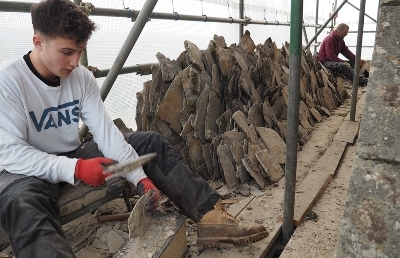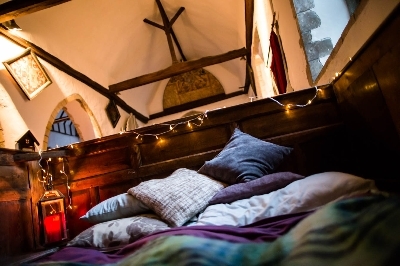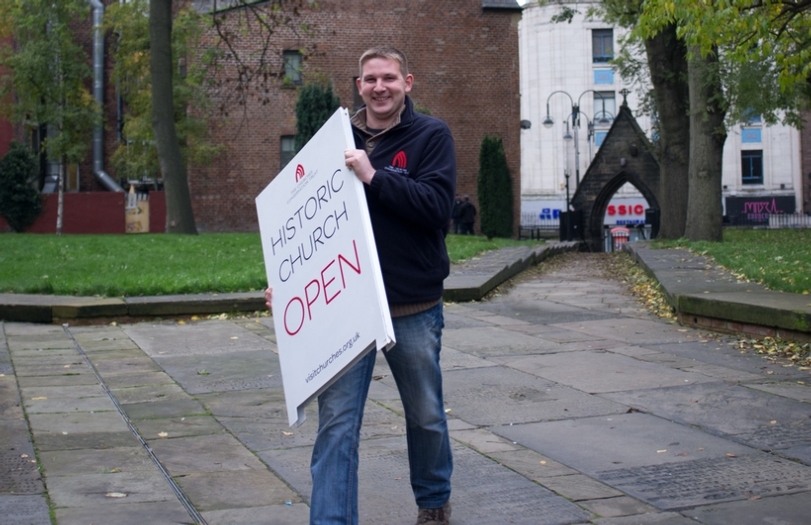The CCT stands ready!
For nearly 50 years the CCT has been adapting to the changing social and funding environment that historic churches face. Being a secular charity with responsibility for consecrated churches means we span the divide between the secular and the religious - we are articulate in all aspects of these places, holding historic parish churches as precious historic, social, cultural and spiritual places.
I consider churches to be the most democratic of historic building types. We believe these buildings are for all people regardless of beliefs, gender, race or sexuality - they are buildings for everyone. With an increasingly secular age following a period where the Church had held great power in the community and nation, the parish church building is in danger of becoming misunderstood and irrelevant.
Community Engagement with Historic Churches
For the last 10 years we have developed techniques and best practice to engage and empower communities to care for historic churches so these extraordinary buildings are not lost, but used and loved.
Our ever-growing collection of historic churches - 352 at present (we officially opened our latest last weekend at Wardley in Rutland) - are ones where the congregation was not able to continue to support the building within the structure of the Church of England, but a partnership between the CCT and the local community means that the building fabric is saved, as is the soul of the church as a community and historic space. It is open to visitors; we support the community to use it for events and we protect the landscape value of the village.
Whilst managing this collection of England’s most important churches, we have developed a process of planning that identifies the best way for the sites to be cared for locally. We discuss what the CCT can do and what the local community can do, looking at community events, fundraising and what it takes to ensure that the building fabric is maintained. Our nationwide network of volunteer support staff, working closely with local communities, undertakes this process.
Maintaining the historic fabric
Our nationwide network of expert staff and contractors – built up over decades - mean we can effectively and efficiently maintain an historic church anywhere in England.

More recently, we have adapted our practice to be able to offer a service to historic places of worship outside our collection. Currently we are working with Norfolk Quakers on their collection of historic meeting houses and are in discussion with other denominations and Anglican dioceses about how to creatively and cost effectively support volunteers maintaining religious heritage. We plan to expand this model as we are uniquely placed to deliver the maintenance but also understand and support the volunteers who have responsibility for these precious buildings.
Sustainable futures
Our regeneration team has been developing and delivering sustainable historic church projects for 10 years and has created effective project systems to support communities in projects large and small.
Our work at All Souls Bolton, a historic church situated in a majority Asian Muslim community, has saved a Grade II* listed church but more importantly given the building a purpose a future and relevance in the local community. Other major projects include Quay Place in partnership with Suffolk Mind, a circus school in St Paul’s Bristol and office space in St Thomas’ Bristol and St John’s Leeds, among many others. We have just secured funding from the HLF to develop St Swithun’s Worcester as an arts venue. Through projects such as this we have developed a unique skill base.
Consultancy
We also offer a consultancy service in the UK and abroad. We are proud to have worked with many clients to secure funding and develop community consultation – including several historic parish churches. We offer strategic advice to dioceses looking at the sustainability of large numbers of churches and we’re developing projects where our staff are embedded in external teams so they have access to our expertise but can deliver in the context the client requires.
New ideas and new audiences

Our success is in turning innovation into useful, practical and sustainable work. Our Champing™ - or church camping – initiative is a live example of a successful product created in the test bed of the CCT that has provided a completely different way for people to engage with, and support, the future of historic churches. The developing franchise scheme enables churches outside our collection to have active sites in the Champing™ portfolio next year.
We continue to adapt and evolve to face the challenges that face historic places of worship and stand ready with our experience, skills and infrastructure to support the future of the people who care for these buildings.

